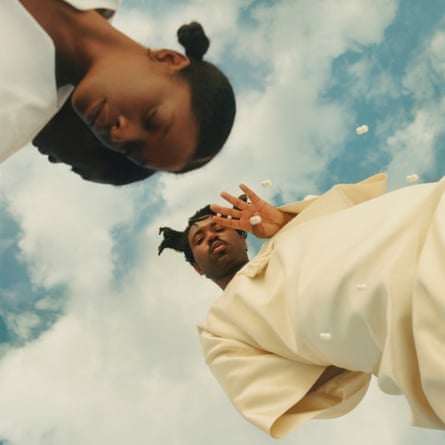In 2017, Sampha Sisay released his debut album Process. A troubled, sometimes harrowing, frequently beautiful response to his mother’s death, it was rapturously reviewed and a Top 10 hit. It wound up high in critics’ year-end polls, occasioned nominations at the Brit awards and the Ivor Novellos, and won the Mercury prize. There was the sense that an artist who had previously lurked in the background – albeit the background of some of the biggest albums of recent years, by Beyoncé, Drake, Kanye West and Frank Ocean – was finally coming to the fore.
But Sisay retreated into the background once more, although his mobile still clearly buzzed with A-list requests. He turned up duetting with Alicia Keys on her 2020 album Alicia, earned a Grammy nomination for his brief appearance on Kendrick Lamar’s Mr Morale and the Big Steppers and had an entire track, Sampha’s Plea, devoted to him on Stormzy’s This Is What I Mean. The latter was a rare moment when Sisay took the limelight: the overall impression was of someone who had taken a look at centre-stage success, decided it wasn’t for him and headed back behind the scenes.
Or perhaps not. Now there is a new album, Lahai, and, like its predecessor, it feels deeply personal. Judging by the lyrics, the intervening six years in Sisay’s life have been taken up with fatherhood, which is referenced as the album progresses (“my daughter here, she’s heaven sent”) and something that sounds like an existential crisis, which you hear rather more about: “chronic trauma”, demons chasing him, projectiles “coming from the side … coming for my life”. Said crisis may or may not have involved a bout of writer’s block – a line that asks “the words I wanted to share / where did they go?” suggests as much – and clearly involved some weighing up of his professional life. “I been in this grind like it’s gonna break my fall,” he sings on Only, before equating “careerism” with a “pothole”.
Moreover, Sisay’s emotional crisis seems to have infected the album’s sound. However beautiful the melodies he produces, however warm and understated his voice sounds – effortlessly rising to a bruised falsetto on Suspended – there’s no escaping the fact that everything around the vocals often sounds agitated. The rhythms evolve into skittering drum’n’bass; even on the slower tracks, the hi-hats seem to be more prominent than anything else, giving the beats an intense, chattering quality. On Dancing Circles and Stereo Colour Cloud (Shaman’s Dream), the keyboard parts take on an insistent repetitiousness that recalls the minimalist compositions of Steve Reich. The backing vocals, meanwhile, seem to suddenly interject, or shudder and glitch: en masse, they can feel as if they are deliberately crowding everything else out, like a mass of thoughts in an over-busy mind. The tension between the tunes – the lovely sigh of Can’t Go Back, Suspended’s luscious soul – and the way they are presented is really effective, drawing you into a saga of indecision, worry and distress.
Sisay’s crisis seems to have been overcome through therapy (“please articulate my anguish, please explain to me why,” he sings on What If You Hypnotise Me?) and – more unexpectedly – reading Jonathan Livingston Seagull, Richard Bach’s squillion-selling 1970 novella of pseudo-spiritual, post-hippy hogwash in which a seagull ponders the purpose of existence and the meaning of freedom, presumably in its downtime from terrorising anyone on the seafront who has a bag of chips. Still, the two songs it inspires are beautiful. Spirit 2.0 (“just like Jonathan Livingston Seagull try to catch the clouds”) is a perfect summation of the album’s qualities – the tune luxurious, but set to a backing that slowly builds from a nagging guitar figure and an icy synth tone into jazzy drum’n’bass. The song titled Jonathan L Seagull offers moody piano chords that occasionally verge on dissonance, sandwiched between luscious choral vocals and ping-ponging video-game electronics.
The reappearance of Bach’s book as a self-help aid, decades after it fell off the cultural radar, is something of a surprise, but needs must: hogwash or not, it evidently helped Sampha, and it is hard not to be pleased about that. Clearly Sisay could have got on fine without making another solo album, concentrating his efforts on songwriting for others, making the occasional guest appearance alongside his superstar pals. That he did – and, more importantly, made an album as intriguing and affecting as Lahai – is worth celebrating.
after newsletter promotion
This week Alexis listened to
Floating Points – Birth4000
With a huge, shuddering, distorted and Giorgio Moroder-esque bassline, Birth4000 is an undeniable order to dance.

